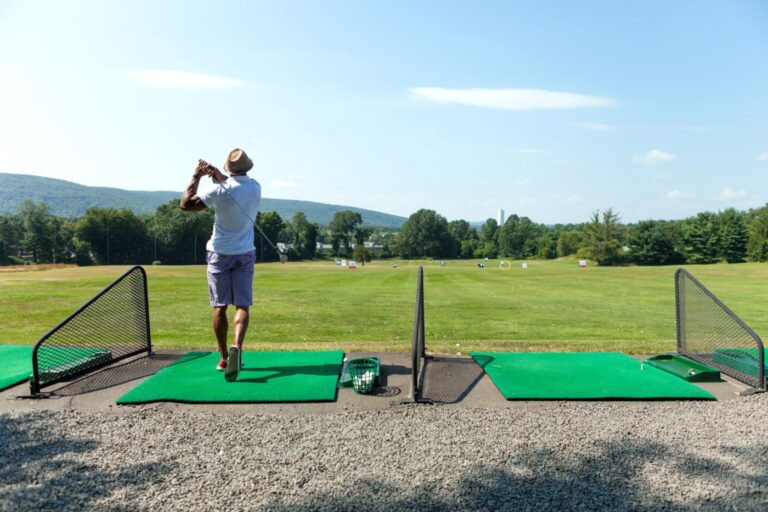Teach Yourself Golf: 4 Best Tips (A Guide for Beginners)
Golf is a game of skill, patience, and dedication, requiring a lot of practice and perseverance to improve over time. While many golfers prefer to take lessons from a coach or learn with friends, others wonder if they can learn the game independently. However, can you teach yourself golf without formal lessons? The short answer is yes, it’s possible, but it requires commitment and self-discipline. In this article, we’ll explore the tips, techniques, and strategies for solo golfers to improve their game and enjoy the sport to the fullest.
Before we touch on the tips and techniques, let’s first discuss any benefits and disadvantages of learning to play golf alone. Although some of these may be obvious, others may surprise you.
Teach Yourself Golf (Advantages)
Let’s start with the advantages, which I believe to be the most critical aspect of learning the game alone. As with anything else, if the positives outweigh the negatives, it is a winning strategy you should pursue if you’re up for the challenge.
Flexibility
Learning to play golf solo allows you to practice whenever and wherever you want. You can choose your pace and schedule without worrying about coordinating with other players or an instructor.
Cost-Effective
Taking lessons from a golf professional can be expensive. By learning independently, you can save money and use the funds to invest in quality golf equipment.

Teach Yourself Golf (Disadvantages)
Here are the possible downsides to learning the game on your own. You will notice only a couple; however, they are still essential to know if you want to decide whether the self-taught route is correct.
Lack of Feedback
One of the most significant disadvantages of learning to play golf alone is the need for more feedback. You will not have a coach or mentor to provide feedback on your technique, swing, and posture.
Risk of Developing Bad Habits
When you teach yourself golf, you may develop bad habits that can be difficult to break. These habits can hinder your progress and make it harder to improve your game. However, with the power of the internet and useful phone applications, developing good habits and learning the golf swing has never been easier.

Golf Tips for Beginners
The following is valuable information I picked up over the years on my golf journey. Although there were times in my career when I was receiving private lessons, much of my game was self-taught. I have not had a formal golf lesson in years—not to say golf lessons are the wrong approach or path for you.
1) Focus on the Basics
Before you begin working on your swing, learning the basics of golf is essential. This includes the rules of the game, golf etiquette, and fundamental techniques such as grip, stance, and alignment. You can find many instructional videos and articles online to guide you through the basics.
Below I’ve listed the five fundamentals of hitting a golf ball. These five core basics will always be important no matter how far you go in the game or to what level. The pros continuously check for these fundamentals to stay on track and improve their games.
The Five Fundamentals
- Stance
- Alignment
- Posture
- Grip
- Ball Position

2) Invest in Quality Equipment
Quality equipment can make a significant difference in your game. While you do not need to break the bank, investing in a good set of clubs, the right ball for your game, and a quality pair of golf shoes, can improve your performance and make your practice sessions more effective, leading to a more enjoyable time practicing and playing golf.
3) Create a Practice Schedule
Golf is a game that requires consistent practice to improve. Set aside weekly time to work on your game, and separate time for playing a round on the course, because there is a difference in practicing and playing golf.
Creating a practice schedule can help you stay focused and motivated. You can set specific goals for each practice session and track your progress. It’s important to customize your practice routine to focus on different aspects of the game, such as chipping and putting. While we’re on the subject of chipping and putting, lets talk about the importance of short game.
The short game is the most critical part of a golfer’s game when it comes to shooting good scores. You will struggle to shoot good scores and enjoy your rounds without a solid short game. Ideally, you should spend the majority of your practice time on the short game. Although there are various definitions for what is considered the “short game” (it depends on who you ask), for me, the short game lies within the area of a shot hit with your longest distance wedge with a full swing (a pitching wedge for me) to getting the ball in the hole; in other words, putting.
Although the short game carries more weight in terms of improving and playing better golf faster, the golf swing is also a key part of playing good golf, and many different factors can impact its effectiveness.
When it comes to practicing your swing, you can use various tools, techniques, and methods, such as a swing trainer, hitting balls on a driving range, or using a golf simulator. Focus on your form to improve your accuracy and power.
4) Utilize Technology
Technology can be an excellent tool for golfers. Various golf apps, golf simulators, GPS trackers, and swing analysis software can help you track your progress and identify areas for improvement.
You can also join an online community, which can be a great way to get feedback, share tips, and connect with others learning the game. There are many forums, social media groups, and online tutorials devoted to helping players improve and enjoy this great game.
If you want to avoid seeing an instructor or it’s outside your budget, research and find an excellent online source for swing instruction. I recommend researching instructors and seeing if they have a YouTube channel; many do nowadays.
Bonus Tip: Though it's not the same as joining an online community, finding a playing partner brings countless benefits to your game by adding a source of competition and making practicing and playing more enjoyable.

Some websites offer video tutorials that can guide you through the various stages of learning to play golf, from the basics of stance and grip to more advanced techniques, such as reading the green and selecting the right club for each shot. Learning the basics will help you build a solid foundation to improve your golf game, regardless of your skill level. Even a pro golfer needs to continue working on and checking the basics.
Bonus Tip: It's also important to remember that golf is as much a mental game as it is a physical one. Managing your emotions and maintaining a positive attitude can be just as important as perfecting your swing. Visualization techniques and mental exercises can help you stay focused and calm on the course, even in the face of adversity. Another part of the mental game is course management, one of the, if not the most important, aspects of playing golf well. Once you learn to play golf with a strategy, you can score well even when you're not playing your best.
5) Practice Golf at Home
One of the best kept secrets of learning how to play golf is practicing at home. In fact, some of my best practice sessions have happened while practicing my game from the comfort of my home. Not only is practicing golf at home a great way to save time by not having to drive to a golf course, driving range, or practice facility, it gives you the advantage of removing distractions and setting up your own practice space that you can utilize at any time of day or night.
When setting up a personal practice space at home to work on your golf swing, short game, or putting, you need to invest in a few pieces of equipment: a hitting mat, golf swing net, and a chipping net. All of the products I use and recommend are listed below.
While learning the game by yourself is certainly possible, it’s important to remember that golf is a complex and nuanced game that requires time, practice, and dedication to improve. However, golf is fun, challenging, and has several health and social benefits. Playing golf can help you stay active, improve cardiovascular health, and reduce stress. It’s also a great way to meet new people and network with colleagues and clients. By taking advantage of the many resources available to you, both online and offline, remaining committed to a detailed practice schedule, focusing on the basics, and getting fitted for equipment when possible, you can teach yourself golf and have a great time playing the game.








